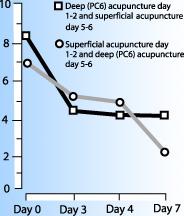| |||||||||||||||||||
| Acupuncture "Clinically Useful" for Morning Sickness By Michael Devitt, Managing Editor, Acupuncture Today Morning sickness is a condition that occurs naturally during pregnancy. Studies show that between 50-80% of all women experience some nausea or vomiting while pregnant, which usually subsides with time. However, between 1-2% suffer a condition known as hyperemesis gravidarium, an instance of morning sickness so severe and long lasting that it can cause weight loss, dehydration, and even hospitalization. Several studies have documented the use of acupuncture to combat nausea and vomiting, with PC6, an acupoint located above the wrist on each arm, among the points most commonly tested. A randomized, placebo-controlled crossover study published in the Journal of Pain and Symptom Management has found that stimulating PC6 appears to ease the symptoms of morning | |||||||||||||||||||
sickness, and that acupuncture has a "clinically useful effect" in treating hyperemesis. In the study, 33 women (average age 28.4 years) were divided into two groups. One group (group A) received active acupuncture, which consisted of deep needle insertion at the PC6 point on both forearms. The second group (group B) received a form of placebo acupuncture, with a needle inserted superficially approximately four inches above the wrist on each arm. The treatment session lasted a total of eight days. On days one and two, each group received their respective acupuncture treatments. After a two-day "wash-out" period, the treatments for each group were switched, with the active group receiving placebo acupuncture (and vice-versa). Acupuncture was delivered three times daily on treatment days, with each treatment lasting 30 minutes. Each day, the women rated their degree of nausea on a visual analogue scale (VAS) of 0-10, 10 being worst; they also documented any instances of vomiting that occurred during the session. Results of the study showed that women given active acupuncture experienced a "significantly faster reduction of nausea" compared to those who received a placebo. This reduction was seen in both groups. In group A, VAS scores dropped more than three points following active treatment; a nearly identical result was seen in group B after that group switched to active acupuncture.
The incidence of vomiting was also reduced in both groups, with a much greater reduction seen in those receiving active acupuncture. At the start of the treatment session, all 33 women had reported some instance of daily vomiting. By the third day of the session, less than half of the women in the active group were still vomiting, compared to 75% of those in the placebo group. Favorable Results Outweigh Limitations Some limits to the study were noted, the most obvious of which was that the practitioners who delivered treatment were not blinded as to what kind of acupuncture was performed. However, such blinding would be considered impossible and should not be held against the study's results. Furthermore, the practitioners did not discuss anything with the patients about acupuncture, and the patients documented their own ratings for nausea and vomiting, with no practitioner present. Another limitation noted that the effects of acupuncture were investigated for only a two-day period following treatment. The researchers justified the short duration of the study, stating that "because no other study exists" concerning acupuncture and hyperemesis, they first wanted "to detect whether effects occur at all, and also determine that side-effects did not present a problem." However limited, the authors said the study "confirms the results from other studies on the effectiveness of manual acupuncture, acupressure, electro acupuncture, and transcutaneous electrical nerve stimulation in the acupuncture point PC6 against different types of nausea/vomiting." They concluded that although further testing must be conducted, "the present study · strongly indicates that acupuncture has a clinically useful effect in hyperemesis gravidarium." Reference Carlsson C, et al. Manual acupuncture reduces hyperemesis gravidarum: a placebo-controlled, randomized, single-blind, crossover study. Journal of Pain and Symptom Management October 2000;20(4):273-279.
| |||||||||||||||||||
|
Home ·
About Us ·
About Fertility ·
F.A.Q. ·
Conditions ·
Success Stories | |||||||||||||||||||

